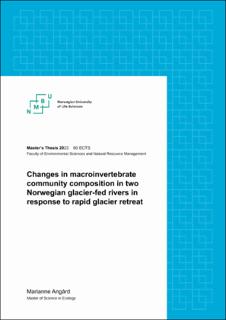| dc.description.abstract | Glaciers are retreating globally in response to a warming climate, and the ecosystems of glacier-fed rivers are expected to change correspondingly. The macroinvertebrate community composition of glacier-fed rivers is shaped by the environmental constraints of the glacial meltwater input, which causes low temperatures and high substrate instability. An increase in biodiversity with decreasing glacial influence is therefore expected. This study, which is part of the international AASER25 project, aimed at identifying a possible upstream shift in benthic community composition, resulting in an increase in local biodiversity, in response to 25 years of glacial retreat in two contrasting Norwegian glacier-fed rivers. The study rivers, Dalelva and Leirungsåi, were sampled in July 2022 and the measured environmental parameters and macroinvertebrate diversity were compared to data sampled in the same rivers in 1997. Both source glaciers had retreated, and while discharge did not change during the 25 years, water temperature showed a marginally significant increase. Spot measurements of water temperature, turbidity and total P were higher, while conductivity was lower, in 2022 than in 1997. Alpha diversity, measured as richness and Shannon diversity, had increased, but the taxon compositions of the samples were more similar to each other in 2022 compared to 1997, suggesting a decrease in beta diversity. Shannon diversity correlated positively with spot measurements of temperature, conductivity, organic material, and pH, and negatively with turbidity and Pfankuch index. Coupled with the increased Shannon diversity since 1997, the correlations suggest changes in these environmental parameters as well. The results from this study show that there has in fact been a change in the macroinvertebrate community composition in the two study rivers, likely in response to glacial retreat and in line with what was expected. If the glacial meltwater input is reduced further, alpha diversity may continue to increase, while the beta diversity may be reduced, as the rivers become mainly snowmelt- or groundwater-fed. | |
